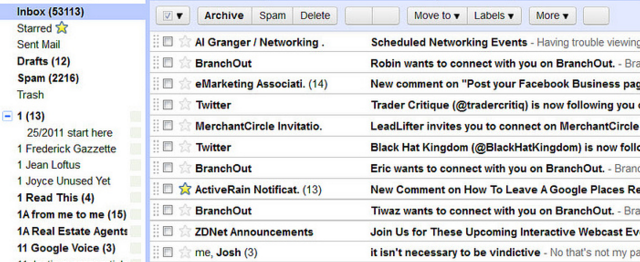There's little more frustrating than going to the effort of writing an urgent email, only for the response to come too late. But the problem may not lie with the recipient. It may lie with you and how you've crafted your message.
Research has uncovered many insights into how to persuade more members of a mailing list to open, read, and click on links within emails. But there's less information about achieving similar goals for personal or work email.
If you have an urgent issue at work, want to introduce yourself to an influencer, or organize a meeting, how do you make it more likely you'll receive a prompt reply to your email?
The following is a list of reasons why replies to your emails continue to arrive late, or not at all. By being aware of these common mistakes and tips, you'll be able to cultivate a faster and more consistent response rate to each of your emails.
You CC'd the Person You Need a Reply From
If you CC people into your message, they will often assume they were included just to be kept in the loop. This lessens the chance of those individuals responding, as they do not feel they were the prime recipient. If you need everyone to reply, avoid using the CC function. Ideally, you should be emailing one person at a time. But if you have to CC, make it clear early in the email that you need everyone to reply, including those who are CC'd.
Your Subject Line Sucks
A quality subject line has to let people know that you need a reply urgently. This means more than obnoxiously titling your email "URGENT". And it doesn't mean you have to be ridiculously detailed.
Something as simple as "Stevo, we need to make this decision by tomorrow" works well. First, it addresses the individual, so they know the responsibility lies with them. Second, the content of that subject line conveys a sense of both urgency and curiosity. This increases the likelihood that the message will be opened right away.
You're Not Stating Your Demand Quickly
We all know that emails should be kept concise. But if yours are more than a few short paragraphs long, make sure your request is in the spotlight from the very beginning, else it may get overlooked.
This means politely getting across what you need in the first or second sentence. You can go into more detail later on, but the premise of what you're after needs to come first.
Your Messages Are Boring
If everyone expects your messages to be dull, waffling, jargon-filled, and too detailed, they will detest the idea of opening your emails.
Instead, make people look forward to receiving an email from you. Use humor. Address people personally. Avoid corporate-speak. Keep your sentences short and punchy. Include a funny GIF. You're still able to brighten someone's day, even if you're asking them for a favor.
You're Not Setting a Deadline
If you need something, let the recipient know exactly when it's needed by. Too often, we're asked to provide a reply "ASAP", or "soon". This makes the deadline subjective. If you say "I really need an answer to this question by 4pm today", however, there's no room for ambiguity.
You're Not Providing Alternatives
Continuing with the example above, it might be the case that the recipient just can't get a reply to you by 4pm. You need to account for this possibility in your initial message by expanding the sentence:
"I really need an answer to this question by 4pm today. If that's not possible, please let me know by midday so I can make alternative arrangements."
The Email Isn't High Priority
If your message really is urgent, you can make this more obvious by marking emails as such in certain email clients. Being able to mark an email as High Priority is possible in Microsoft Outlook and Apple Mail. Unfortunately it's not possible in Gmail, so the closest alternative is to precede your subject with "URGENT:"
This should only be done in genuinely urgent cases. If you're seen to do this too often, this tip will lose its efficacy.
You're Not Making a Threat
This sounds worse than it is. Let the recipient know that if a reply is not received by a set deadline, then certain consequences will follow. As an example: "If I've not heard back from you by 2pm, I'll assume everything is ok, and I'll send the $10,000 to the contractor".
If the recipient then chooses to ignore the question, they know, explicitly, that things will still continue without their input. If they want their voice to be heard, they need to speak now.
You're Not Helping
If your request is very broad, the recipient will often think they have to craft a more eloquent reply than is needed. Let them know if a simple "yes" or "no" will do. If you're arranging a meeting, offer three or four convenient times as a starting point. Do what you can to make replying to the email less of a burden to the recipient.
You're Emailing at the Wrong Time
If you know that your manager is always rushed off their feet on a Thursday afternoon, don't wait until Thursday morning to send the email if you could have sent it on Tuesday. If you know that your colleague has tons of emails at the start of each day, perhaps wait until you know they have gone through their inbox before sending your message. This makes your email less of a needle in a haystack.
You're Sending Too Many Emails
If you're known around the office as being a relentless emailer, your colleagues will quickly become blind to your inbox pleas.
Make it a habit that the emails you send are important emails. Then, when someone sees a message from you in their inbox, they're more likely to take notice.
You're Ungrateful
If you keep asking people for things, and show no gratitude, very soon people will resent helping you. In the world of email, this translates to people simply ignoring you. They would rather reply to, and help, other people who respect their time and effort.
So if someone replies quickly, thank him or her. If they go out of their way to respond to you, or help you, make sure you show you're grateful.
Give It a Try
If receiving slow replies or no replies is a problem you've been having, try to avoid each of the above mistakes. By doing this, each of your emails will more likely be opened, read, and replied to quickly. Once you've done this for a few weeks, it should become second nature. Before you know it, you'll be an email expert.
What other email techniques help you to receive a prompt reply? Have any of the above been particularly effective for you?
Image Credits: boring job by Ditty_about_summer via Shutterstock, Each Day Is Valentine's Day by Lili Vieira de Carvalho (Flickr). Are we nearly there yet? by Stuard Richards (Flickr). caution - steep steps : 1 by Crystian Cruz (Flickr). Inbox Triage With Gmail by David Bruce Jr. (flickr).





